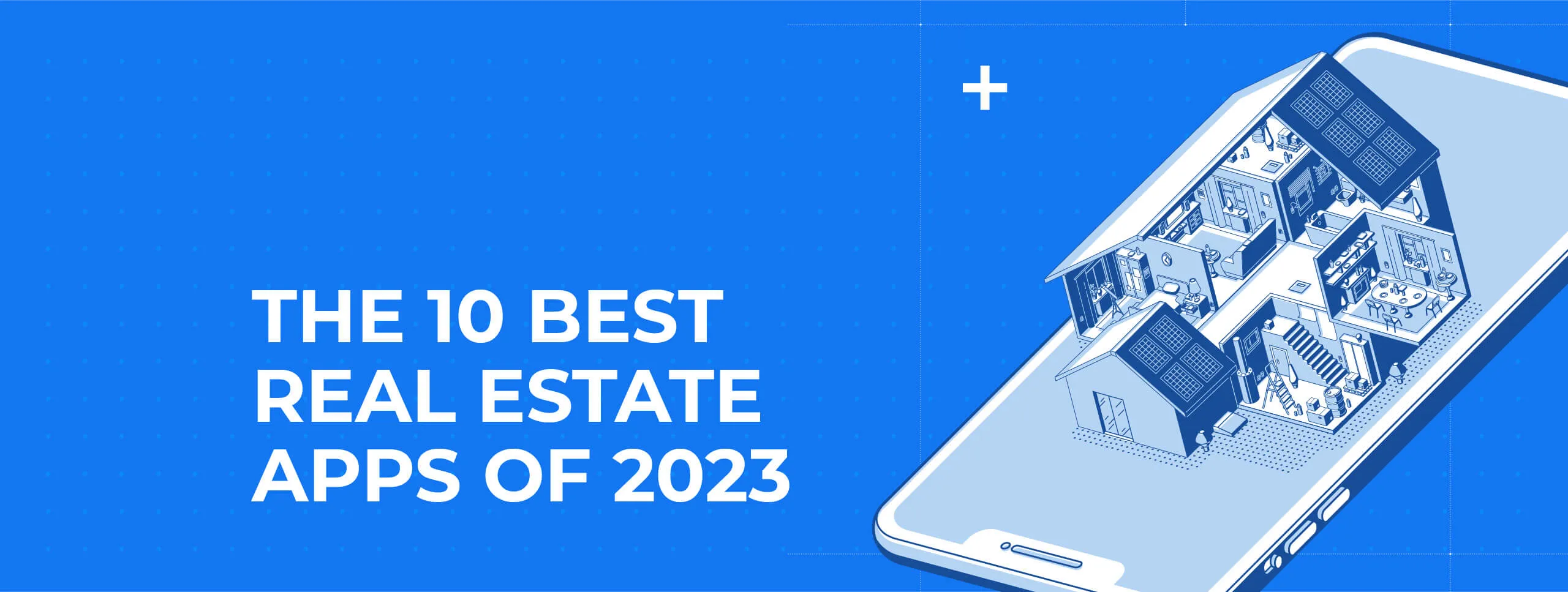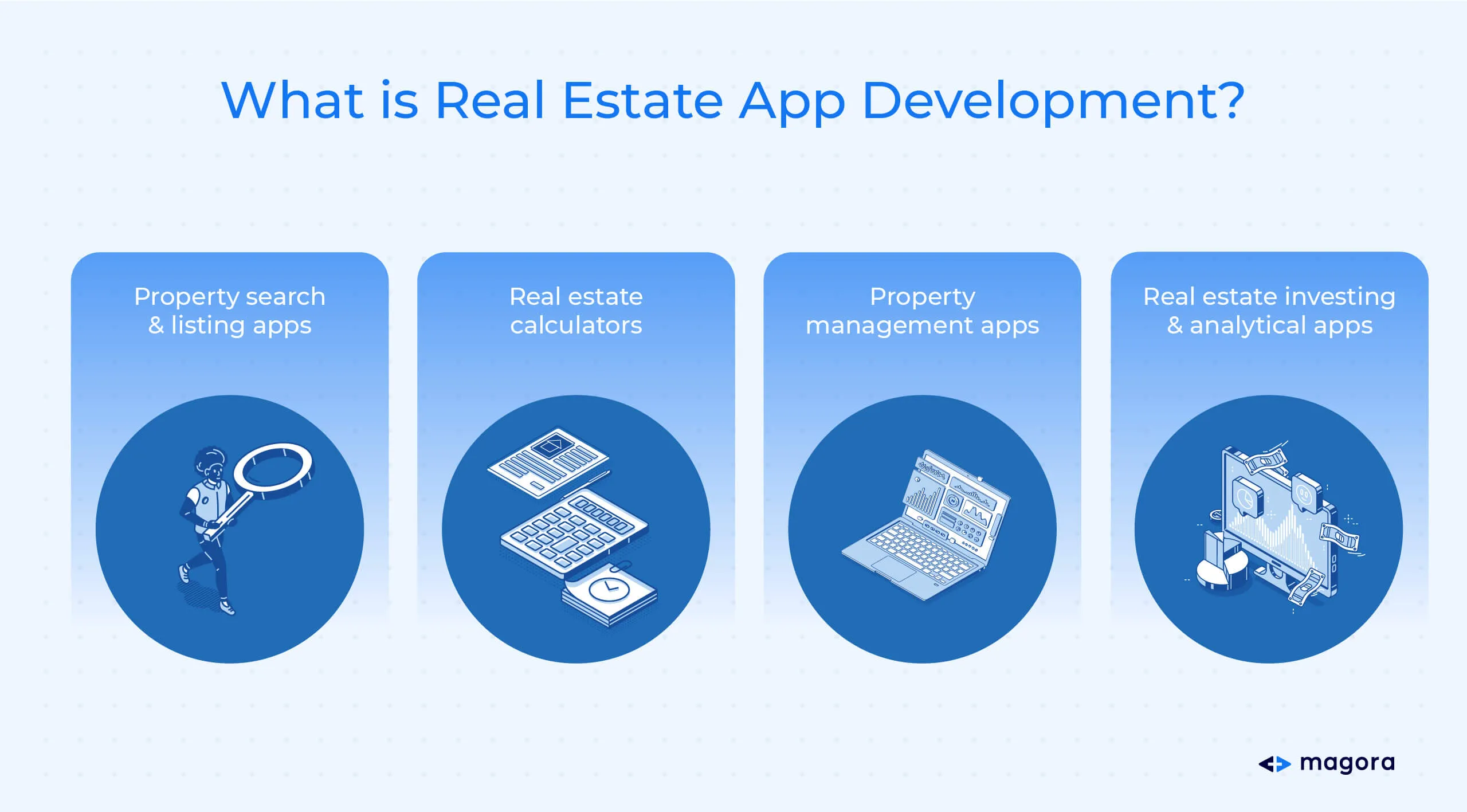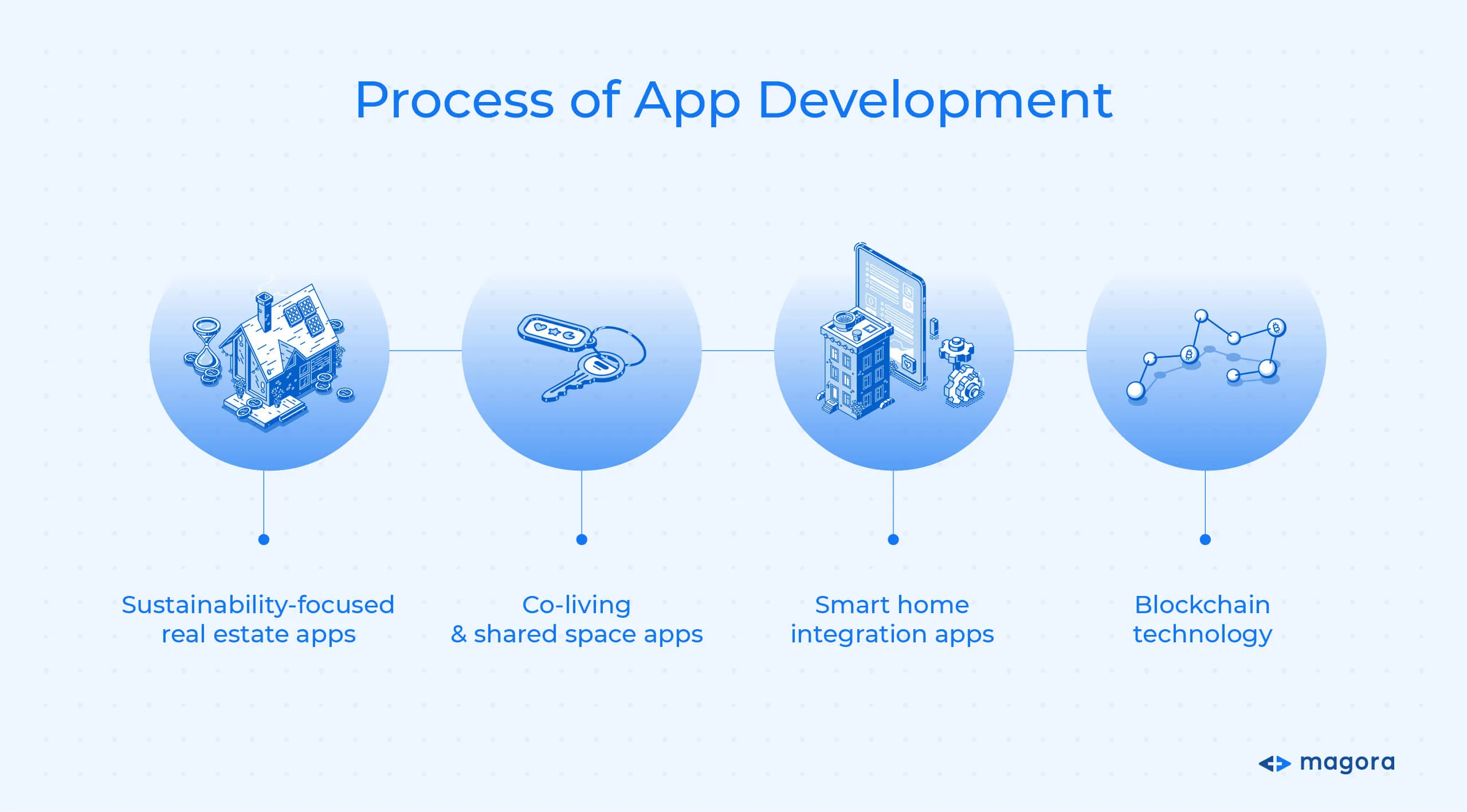
The 10 Best Real Estate Apps of 2023

Table of contents
- Introduction
- What is Real Estate App Development
- Why Should You Build a Real Estate app? Market overview
- Trends in Real Estate App Development
- 10 Best App for the Real Estate Market
- How Much Does It Cost to Develop a Real Estate App?
- Magora Case Studies
The real estate industry is considered to be one of the most conservative markets, which used to stand away from the rapid digital shifts. Nevertheless, a mass relocation to the digital world has pushed even the property industry to evolve and embrace the gifts of progress. Moreover, COVID-19 has enhanced this effect. Now we can see the transformation of the underlying concept: firms downsize their offices and create flexible workspaces. Nearly every fourth millennial prefers to rent a house rather than buy one. Unfortunately, sometimes it is a necessary measure, as we see now with the rising rates of inflation around the world and fewer people being able to afford to buy property. But one of the key intentions of the prop technology is to make housing affordable. That is why digital real estate amenities and the speed of workflow have become mainstream. People are given a greater choice, more accurate information, and easier execution of a deal.
What is Real Estate App Development?
There are many participants in the real estate market: sellers, buyers, agents, and investors. Real estate app development is a process of mobile app or software creation that answers the needs of each group. Also today, you may find the popular term "proptech" (property technologies) out there. It includes tools and companies that create innovative solutions in the spheres of commercial, residential, and industrial real estate for every piece of its life cycle. Such technologies provide fast searching opportunities, secure transactions, and effective property and document management. The complexity and functionality, as well as the type of real estate app, depend on the ultimate goal and the target audience your app is focused on. Therefore, below we describe some of the types of real estate apps and highlight their differences.
Property search and listing apps
Such apps as Zillow and Trulia help people easily navigate through huge real estate databases to find the perfect variant for renting or buying. It is possible by building on different criteria, such as location, price, or internal design. You can always see photos, read a detailed description, or even take a 3D tour.
Real estate calculators
When it comes to buying or renting a house, for example, no one wants to miscalculate or overestimate his financial possibilities and get into trouble. For such situations, there are different types of calculators on the real estate app market. Mortgage calculator, refinance calculator, or seller’s net calculator—whatever the situation you are in, these apps will help you make wise decisions relying on math rather than just good emotions after visiting properties.
Property management apps
This tool is designed to ease the handling of rental properties for landlords, managers, and owners. In order to deliver higher productivity in the process of property management and iron out multiple financial kinks along the way, there are such apps as AppFolio, Rentpal, or DoorLoop at your service that easily enhance the efficiency of the rental processes, automate routine tasks, securely store documentation, and gather analytics for further improvements.
Real estate investing and analytical apps
The real estate market has been one of the people’s main financial protections throughout history. Apps for real estate investments provide customers with accurate data and insights on how to make money by investing in the property sector, and also determine the right moment to buy or sell property.

Why Should You Build a Real Estate app? Market overview
The real estate market has experienced a great necessity for digitalization during COVID-19. Each year, the number of smartphone users is steadily growing. People nowadays are searching for maximum convenience and a great customer experience, which is why they enthusiastically receive all the innovations enabling them to remotely control the whole house ecosystem by clicking one button as well as buy a house using safe smart contracts. According to the Grand View Research forecast, the real estate software market is expected to reach £15.01 billion by 2028. Some serious challenges that the property sector is facing today have great potential to be resolved using technological solutions. The distance between participants in property agreements narrows, providing each side with more freedom and flexibility. The vast majority use their smartphones in order to find a flat for rent, visiting several places in one day with 3D tours and making fast decisions. With real estate app development, it becomes easier to understand your target audience and gather feedback to make improvements to the marketing strategy. With apps, it is possible to create long-term personalized relationships, for example, by sending exclusive offers that increase customer engagement. Fewer errors, faster data processing, and structured data storage are the results of workflow automation owing to real estate software. Property value estimations based on AI will save your team time and effort, and chatbots will support your customers whenever they need it. The PropTech market is predicted to develop at a CAGR of 16.8% with a market share of £69.5 billion through 2032. Still, 47% of home buyers search online before contacting an agent. The statistics say that there is space for developing and expanding as the process of buying, selling, or renting a property has many underwater stones and consists of multiple forms to fill out. People prefer to have a guide represented by an agent to avoid any difficulties and feel safe.
Trends in Real Estate App Development for 2023
The world’s progress rushes ahead, and certain technologies influence almost every industry, including real estate. However, changes do not come easily or quickly here. Nevertheless, there is much sense in riding the innovation wave and being the first in the game. Remember, one of the businesses’ goals is to satisfy the market's needs, and no doubt people want to smooth the process of buying, renting, and selling and make it as comfortable as possible. Here is a list of some trends to which you should direct your attention.
Sustainability-focused real estate apps
Still, we have climate issues in the first place, and that is why businesses should pay enough attention to the creation of environmentally friendly homes provided with energy-efficient supplements, follow regulations and certifications during erection processes, and also use green materials.
Co-living and shared space apps
With a new generation coming into its full power, new trends are arising according to their principles and values. Today, we see more flexibility in people’s lives, and buying a property is not the only option. In order to have more freedom, people choose to rent or share space instead of buying a house, thus avoiding paying real estate taxes and maintenance costs but receiving access to some valuable amenities. Investment flows are growing from year to year, and it is already a very attractive place to live, communicate, and maintain hobbies.
Smart home integration apps
The idea of smart homes and the whole city infrastructure fits perfectly into the first trend concerning sustainability as it helps to save resources such as electricity and water, enhance safety, and complete routine tasks, freeing our hands. AI integration allows you to streamline the smart home management process and gather useful analytics for further predictions, making the smart home system adaptable to your needs. According to IoT Business News there will be approximately 27 billion connected IoT devices by 2025.
Blockchain technology
Blockchain technology has already been used as a secure and transparent payment method. Moreover, it allows for stacks of documents to be avoided as property ownership is recorded on a decentralized ledger, eliminating cases of fraud and scams. All counterparties are able to see the transaction’s status with fast access to its realization. This technology tends to revolutionize the real estate industry by offering more freedom and security during the process, from the start when sellers meet with buyers until the final point.

10 Best app for the Real Estate Market
- Zillow is one of the most famous apps that specializes in buying, selling, and renting property. It is notable for its rich functionality and huge database, which covers over 135 million items. Using accurate search filters, users are able to find an option that is perfect for them in the shortest amount of time. There is also a mortgage tool implemented, which makes it convenient to calculate right away whether the cost is affordable enough.
- Xome Auctions app is a platform for purchasing and selling real estate. However, there is a peculiarity in the way it works—by bidding at the auction. The app provides seamless navigation, robust search filters, push notifications, and many other useful features. A great advantage of the platform is the opportunity to conduct the whole process online, even down to signing a contract, right within the app.
- Trulia is an online real estate marketplace that was launched in 2005. More than 20 million users visit Trulia every month. It is built on the Zillow database, however, provides information differently. A distinctive characteristic of Trulia is a detailed neighborhood description and various statistics that result in great insights. It is valuable for making an informed decision while choosing your dream home.
- LoopNet is an app providing an extensive database of commercial property to buy, lease, or auction. As a standard real estate app, it has search filters that you can save, tag favorites, and share listings. Immediate alerts will notify you if there is a new item that meets your criteria. In order to make an appointment to go on a tour, users can connect to commercial listing brokers via the app.
- Fundrise app is an easy-to-use guide to the world of long-term real estate investment. It is available to all (non-accredited) investors and has a low entry threshold. Fundrise’s audience includes more than 387,000 active investors. There is an annual advisory fee of 0.15% plus 0.85% of an asset fee. However, the company strives to make property investments available to everyone.
- Buildium is a unified platform for property management solutions that gives full control of financial operations and streamlines multiple routine tasks, including residence maintenance. The platform provides online payment control via Buildium’s tenant portal. Using the Buildium app, communication with tenants and vendors becomes much easier via emails or SMS messaging. Customers highly value the usability of the app and its intuitiveness.
- With the aim of carrying out investment activity properly and successfully, anyone needs thorough and in-depth research and analytics before making a wholesaling purchase. Deal Check app is an indispensable tool that shows all the numbers standing behind the deals. A comprehensive report can be seamlessly imported so that it is of interest to investors. It is used by more than 250,000 investors and has been featured by Forbes, MSN, and others.
- Houzz app will help you re-energize your home furnishings or ennoble the absolutely bare walls of your new property. The app is able to find an executor for any work from an architect to a landscape expert. 25 million home interior and exterior pictures will help you find the best style and be good references while decorating or building your home.
- IBM TRIRIGA is an Integrated Workplace Management System (IWMS) that combines IoT and AI technologies. It was designed to help organizations handle and automate space optimization processes, manage environmental and energy resources, and provide financial data and real estate portfolios. Connecting different functions of the ecosystem in one place, it maintains central administration, enabling cutting costs and enhancing business performance.
- Redfin is a real estate brokerage, but here we would like to emphasize its value estimation option. In order not to lose money by selling property at a low price or to scare away potential buyers with crazy prices, it is always a good idea to use a home value estimator. It analyzes your apartment according to such criteria as the neighborhood’s walkability, the local schools, and the prices of apartments sold in your area.
How Much Does It Cost to Develop a Real Estate App?
Finally, you’ve collected your thoughts and have a strong intention to build your app. Now is the time to understand how much resources it will take and what are the factors that influence the most the total real estate app development cost.
But first, before any calculations, we would like to remind you about an MVP version of your app that undoubtedly has many advantages and will be beneficial for you. An MVP version is the basic skeleton of your future app with its core features. It requires less expenditure and time, but it gives you a fount of knowledge about the real user-app interaction and their experience. Such information will bring you a wider understanding of further improvements and the whole development path.
When working with Magora, we provide you with a detailed cost estimation plan that isn’t a box of surprises, and we are also ready to make a rough calculation of your project in 24 hours, “peppering” it with our expertise.
One of the main factors that carries a lot of weight is the complexity of the app. Here, it is better to conduct a thorough investigation of your target audience and the needs it has in order to implement the right functionality. Don’t neglect the must-have features such as user profiles, databases, search with filters, push notifications, messenger, and a few others depending on your app idea. Mapping is also a very useful tool for real estate apps; however, keep in mind that complicated third-party integrations will make the cost higher. The second factor is the platform that your app is going to work on. Maybe it will be a web app instead? Thirdly, the development team’s location and team’s structure. There are multiple different combinations of possible variants; each will have its pros and cons. Freelancers, an in-house team, or a hired development agency? India, the US, or, maybe, Northern Europe? To answer this question, it is necessary to analyze the amount of work and time you have. Fourth, apps should be visually pleasing and intuitive, because customers will not waste time on complicated explanations. Lastly, take care of the expenses on app maintenance and marketing, as both are of great importance and their absence may spoil previous efforts. The real estate app development cost may vary from £65,000 to £80,000 if we take the Zillow app as an example.
Magora Case Studies
In our portfolio, you may observe a list of the successful real estate projects we are proud of. The Magora team has substantial experience in developing software solutions to deal with pressing issues that businesses face every day. We’ve created software that gives our clients complete access to property management and structured databases of the real estate market. Modern technologies can significantly facilitate professional lives through the automation of routine tasks. As it was during the development of the Estate Rental Management System. The main objectives were to create a secure system to store and operate with customer or rental object data, calculate expenses and ROI, and make reports using comparisons and graphical illustrations. An MPV of the web application was developed in four months. We followed the GDPR prescriptions to guarantee security and have achieved a 30% reduction in time for routine tasks. Another project—STU’s view—is the mobile and web applications that allow graduated students to search for an apartment with ease. Google Maps was used as a base, and some extra options were added, such as searching by tags, a favorites list, and preliminary online approval. We also developed a web application for one Australian company that effectively calculates the amount of heating and cooling equipment according to the room parameters. The app creates a PDF summary that helps engineers speed up the installation of equipment.
Need more information about our services?





